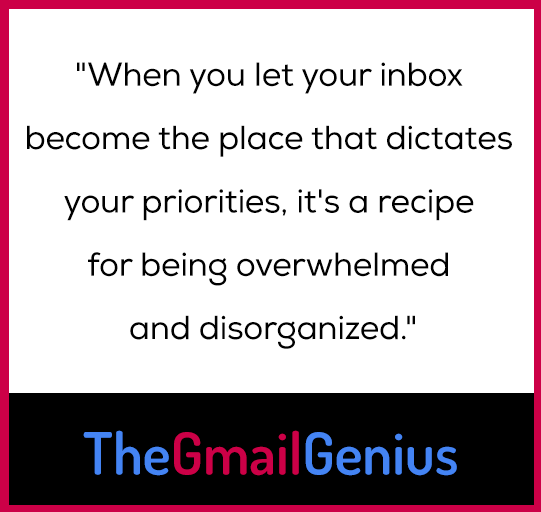How I Email: Curt Steinhorst, Consultant and Author
Email is a non-negotiable part of everyday life. For some, it’s an unruly time suck, but enlightened email users have systems to ensure they’re not a slave to the inbox. We’re asking smart thinkers to give us a peek inside their inboxes, share tips, ideas, gripes, and everything in between.
Curt Steinhorst is the founder of Focuswise, a consultancy that helps workplaces minimize distraction while facilitating communication. He studies, speaks, and writes about the ways in which generational divides and communication technologies have impacted the modern office. To keep your emails from dictating your priorities at work, Curt suggests separating your task list from your inbox and filtering liberally.
How should we treat email so that it doesn’t get in the way of staying focused?

Communication is the foundation of every aspect of life and relationships, and we know that email plays a central function in that. The reason I always want to start there is because we have to recognize that it’s not just a side thing, like, “Oh, I have an email problem, I’m overwhelmed by my inbox.” We need to have a fundamental strategy and understanding of how we approach this, because it impacts every other aspect of life and work.
The challenge of email is that it is a landing place for divergent and unrelated conversations. We get to our inboxes, and we have messages from totally unrelated spheres of our life and work—and then we wonder why we don’t feel like we’re getting on top of it. When I think about an approach to emails and inboxes, there are a few things that I’m really cognizant of.
Number one: We have to create filters so that everything doesn’t come in all at once.
Number two: How do I offload the labor and time as much as possible while still getting the benefits and meeting the requirements of today?
People have always been in conversations. Email has made it all written, and the advantage of that is there’s a record of it and we can respond to it whenever we want. The disadvantage is that writing takes a lot more time, especially when we want to be professional. And so, all of a sudden, what should be a three minute conversation becomes a really long one.
Tell us more about your process for filtering emails.
The goal at a high level is for technology to filter for us, rather than having to actively do the organizational filtering. I have folders and auto systems in Gmail that directly shift all of my daily news sources like theSkimm or The Hustle out of my inbox, because they’re not urgent. So that’s number one.
Number two, I move the work of email and the responsibilities of email off of email. So I look at my inbox at the beginning of the day, and I make a list of the people I have to respond to today. And so my task list is separated from my inbox. When you let your inbox become the place that dictates your priorities, it’s a recipe for being overwhelmed and disorganized. I write my emails in Evernote, for example, and then I put it back into my inbox.
Third, I use Unroll.Me to gather up all of my subscriptions. I want to stay on my J.Crew subscription because I might want the 20% off coupon, but I don’t want it at 2:00 pm on Thursday. I get a one-day summary digest of Unroll.Me. That also goes into that “daily news” category. So all the stuff that is never urgent, it all goes into one place and it’s filtered.
Are there certain times of day that you check email?
At the beginning of the day, I do a full accounting of what I need to do and then I schedule out my day. So I set parameters around the projects that I do, and when I’m doing those projects, my inbox is never around. Then, in the gaps between those projects, I leave space, and that’s when I go click in and check my inbox.
The best practice you’re supposed to do is email chunking—group it, like “Four times a day, every day, I’m going to check my inbox.” That’s great, but there’s a middle ground that’s more realistic. Schedule in the stuff that’s important, and make sure that the inbox doesn’t take priority at every moment of the day. But there are all these little breaks. Flipping in real quick, making sure there’s nothing new, is fine. The key is that you want to check your inbox, not live in it.
Are there any other tools or applications that you find really help with email?
I’ll give you two. I use Grammarly, which gives you squiggles when you have misspellings. That’s base level for improving writing, but there is no more important solution to save me from email than Wordzen. And the reason is this: I am a perfectionist. I’m particular, I wrestle with words. I literally can spend 45 minutes changing sentence order. Anyone who says, “Don’t worry about it, go fast,” fails to recognize how absolutely critical the quality of your emails are.

It’s impossible to overstate how much time I save with Wordzen because I know that I have someone else who can either give a stamp of approval or rewrite my emails. That means I don’t have to have it perfect, and it clears a weight and a burden off of me.
You were diagnosed with ADD as a child. What perspective does that give you on managing distraction?
Being diagnosed with ADD as a young kid put my attention on coping mechanisms and strategies a lot earlier than most people. There’s this odd conversation with ADD where someone will say, “Oh, no, it’s actually a strength.” And there is truth to that—but it also can completely derail you and make you fall apart. Early on, I was able to say, “I have to figure out how to allow this to be a strength.”
Then, as I’m entering into this digital era that started when I was in my twenties, seeing the digital onslaught come about—in some odd ways, I felt like it was just the same. I’ve always hated being bored. I’ve always wanted to move into a lot of different things, I didn’t sit and watch TV well. I’ve always avoided homework. I’ve always avoided projects, so I almost felt like it was a little bit of a lower transition for me.
If there was one thing you could change about email, what would it be?
In a perfect world, I would fix humans. I would make them not feel the need to reply as soon as they get a message. But we can’t change that equation. What we can do is have technology that better filters and organizes for us so that we’re only interrupted by the things that deserve interruption.
I would also try to shift more of the exchange to audio and video—more audio in particular. People want to go video, but that’s too embarrassing. We want to perfect ourselves. I think asynchronous audio is a better solution.